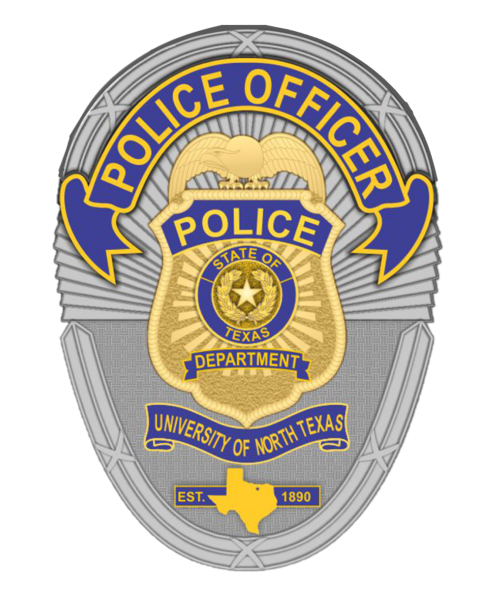Sworn Positions

Working with the UNT Police Department will be an experience you won't get elsewhere. The UNT campus, including our police department, is a tight-knit and inclusive community that supports our diverse students, faculty and staff. Many of our officers are UNT graduates or students because we put a high value on education and training. That emphasis led our department to a rare dual accreditation, showing both our concern for our community and our dedication to professionalism. Our 46 state certified police officers enforce municipal and state laws, and UNT policies, while providing service to campus 24 hours a day, every day of the year. The department has full law enforcement jurisdiction within the UNT campus, city of Denton, and any county where UNT maintains property. We proudly serve these areas, taking time to get to know our community and partnering with them to provide a safe environment for their learning and professional development.
Training
New officers will attend a local police academy, if unlicensed. The academy is followed by an intense and demanding field training program, which is completed by all officers. Officers will receive additional training throughout their career. This will include state required training, department mandated training, as well as specialized training for individual officers or units.
Assignments
Police department employees work in one of two reporting units; Operations or Support Services.
Operations
Officers begin their career in Operations working on a patrol shift. Officers work on one of four shifts which are 12 hours in length and provides 24 hour coverage (2 day shifts and 2 night shifts). This schedule affords patrol officers with every other weekend off (Friday, Saturday and Sunday). The shifts rotate between days and nights about every four months.
Patrol officers provide law enforcement services to the main campus and surrounding area, UNT Discovery Park, remote university offices, and UNT property throughout the Denton area. These services include, but are not limited to, responding to calls for service, apprehending criminal suspects, writing reports, conducting traffic enforcement, completing preliminary investigations, as well as other pro-active law enforcement and community engagement services. Officers patrol in marked vehicles, on foot, and bicycle.
An important part of Operations is the field training officers (FTOs). Made up of seasoned officers, our FTOs play a vital role in developing new officers by training these officers in the field.
Operations is also responsible for coordinating and scheduling officers for special events, and provides a representative for the university event safety committee. Officers can sign up to work these events for overtime compensation. Special events include athletic events, university graduations, high school graduations, campus sponsored events, and private parties held on campus.
Investigative Services
Investigative Services is made up of detectives who investigate crimes reported to the police department, and civilian support staff who maintain police records, evidence and property. Detectives receive specialized training to investigate a wide variety of offenses including: burglary, robbery, assault, sexual offenses, and death investigations. Detectives may work to recover stolen property, conduct forensic examination of a crime scene, obtain and serve search and arrest warrants, and prepare cases to file with the district attorney's office. Detectives also conduct detailed interviews with victims, witnesses and suspects.
The cases worked by our detectives take them to locations not only on campus, but also throughout the city of Denton, the DFW Metroplex and anywhere an investigation may lead them.
Support Services
Support Services is made up of officers and civilians who work in law enforcement accreditation, training, community relations and police dispatch. A civilian accreditation manager overseas department policy and makes sure the agency complies with standards set forth by the Commission of Accreditation for Law Enforcement Agencies, Inc. (CALEA) and the International Association of Campus Law Enforcement Administrators, Inc. (IACLEA).
The training unit overseas all department training and maintains each officers' training file. The training unit works with outside agency instructors, as well as department members who are law enforcement instructors. Experienced officers may choose to become a law enforcement instructor and teach law enforcement classes for the department and outside agencies. Continuous training throughout an officer's career can include classroom instruction, firearms training as well as scenario based training.
The community relations unit is made up of officers who specialize in working with our community to promote safety and better understanding between the community and police department. They work with community members and groups on campus, and provide public presentations for the campus community. These presentations are conducted for community groups, students, faculty and staff.
The police department houses a fully functional dispatch center with state-of-the-art radio and computer equipment. Dispatchers receive emergency and non-emergency phone calls, dispatch officers via radio and monitor their activity, and monitors the fire and burglar alarm systems for the entire campus. The dispatch center is operational 24 hours a day, 7 days a week. The dispatch unit is staffed by a supervisor and eight dispatchers.
 |
Officers make up the majority of the police department and can be found on patrol shifts, working as detectives in Investigative Services, and staffing the community relations unit. While the officer rank is not considered a supervisor, because of the nature of police work, officers have a great deal of responsibility and discretion. |
 |
Corporals can be assigned to any unit within the police department. On a patrol shift, corporals serve similar roles to patrol officers, but may take on a higher level of responsibility. Corporals also serve as field training officers, patrolling with and training new officers. Other areas of the department corporals can be assigned to include the Investigative Services, community relations unit, and administrative support. |
 |
Sergeants are first line supervisors in the department. On patrol, sergeants lead a shift of officers and may be the highest ranking member of the department on duty. Sergeants are also found supervising detectives in the Investigative Services unit and leading the department's training unit as Training Coordinator. |
 |
Lieutenants are command staff level officers in the department. In the Field Services unit, a lieutenant serves as either the day shift or night shift watch commander and supervises two patrol shifts and their respective sergeants. A lieutenant may also serve as a supervisor in the Investigative Services unit or in an administrative supervisory role. |
 |
Assistant Chiefs are executive command staff level officers in the department and report directly to the Chief of Police. Assistant Chiefs lead one of two units; Operations or Support Services. Assistant Chiefs are not only responsible for the supervision of their units, but also work on budgeting, long term planning, and special event coordination. |
 |
The Chief of Police is responsible for overall command of the police department and its nearly 70 employees. The Chief directly supervises the Assistant Chiefs, business manager and their executive assistant. |